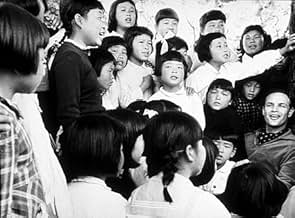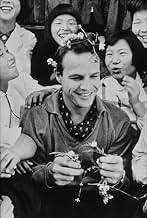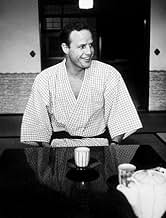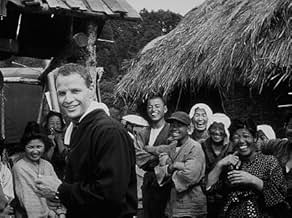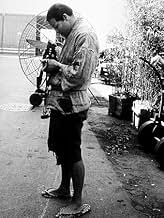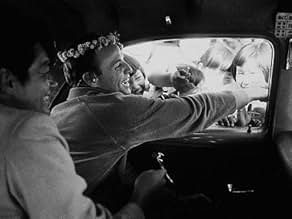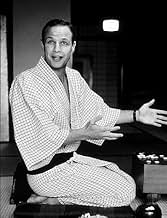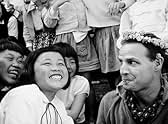AVALIAÇÃO DA IMDb
6,6/10
4 mil
SUA AVALIAÇÃO
No Japão pós-Segunda Guerra Mundial, um capitão americano é contratado para ajudar a construir uma escola, mas os moradores locais querem uma casa de chá.No Japão pós-Segunda Guerra Mundial, um capitão americano é contratado para ajudar a construir uma escola, mas os moradores locais querem uma casa de chá.No Japão pós-Segunda Guerra Mundial, um capitão americano é contratado para ajudar a construir uma escola, mas os moradores locais querem uma casa de chá.
- Prêmios
- 1 vitória e 9 indicações no total
Machiko Kyô
- Lotus Blossom
- (as Machiko Kyo)
Harry Morgan
- Sgt. Gregovich
- (as Henry {Harry} Morgan)
Carlo Fiore
- Soldier
- (não creditado)
John Grayson
- Soldier
- (não creditado)
Harry Harvey Jr.
- Soldier
- (não creditado)
Miyoshi Jingu
- Old Woman on Jeep
- (não creditado)
Roger McGee
- Soldier
- (não creditado)
Dansho Miyazaki
- Sumata's Father
- (não creditado)
Minoru Nishida
- Mr. Sumata
- (não creditado)
Aya Oyama
- Daughter on Jeep
- (não creditado)
Avaliações em destaque
Marlon Brando stars as a Japanese interpreter and Glenn Ford plays a captain who has been in almost every branch in the military. Ford is ordered to go to a Japanese village to teach the people about democracy and to build a schoolhouse in the shape of the pentagon. The Japanese are only interested in building a teahouse and their isn't enough money to build both. The Japanese try to sell some homemade stuff but it won't sell until Ford finds out that they also make brandy. The military can't get enough brandy, so they build a teahouse instead of a schoolhouse. The military don't like what Ford is doing so they send a psychiatrist but he ends up helping them out instead. I thought Glenn Ford was great here and Brando also did a good job.
Casting Marlon Brando in this film as Sakini, a Japanese interpreter for American troops in post WW-II Japan is considered by many critics and film historians alike as one of the worst casting errors ever made in a film history. In my opinion, though, Marlon Brando is the one responsible for turning this quite an average film into a hillarious comedy. Yes, they really did it. With a little bit of make up and great effort from actor's part to learn Japanese mannerism and language in order to get an accent in his speech we have here Marlon Brando in his most unimaginable role. The rest of the cast is also quite good, namely Paul Ford as Colonel Waiwright Purdy III, a somehow cliche figure of stubborn, narrow minded US military officer and Glenn Ford by his side as Captain Fisby, for whom Brando's character Sakini ends up working as an interpreter and, of cause, unforgettable Machiko Kyo, as a spirited geisha, whom lovers of Japanese cinema must remember from Akira Kurosawa's films.
Directed by Daniel Mann (Butterfield 8, Come Back, Little Sheba) and based on John Patrick's stage play that was a big hit on Broadway at it's time, The Teahouse of the August Moon is slow in parts and in terms of some aspects of the story considerably aged and outdated but still funny and entertaining movie. 8/10
Directed by Daniel Mann (Butterfield 8, Come Back, Little Sheba) and based on John Patrick's stage play that was a big hit on Broadway at it's time, The Teahouse of the August Moon is slow in parts and in terms of some aspects of the story considerably aged and outdated but still funny and entertaining movie. 8/10
I just had the chance to see this charming movie again in widescreen format in what evidently is a new or restored print on Turner Classic Movies, and I'm realizing that I love the flick more and more each time I see it. The wonderful cast - Glenn Ford, Paul Ford (ironic - no relation!), Eddie Albert, Marlon Brando and Harry Morgan - do a fine job of playing out the movie's humorous meditation on culture clash, and the ability of a strong but flexible people to maintain their Eastern ways in the face of Western "aid". Brando, in particular, is surprising; this is about as far from Stanley Kowalksi or Terry Malloy as you can get, and one would not think him able to do much with a humorous, cross-racial characterization, yet the brilliant and convincing manner in which he pulls it off reminds us of the great thespian talent he once possessed and which he tended to squander as his life progressed. I believe this film had its origins in a very successful stage play; we can thank the forces involved for committing this funny, charming, and ultimately heart-warming story to celluloid. Best line: "I've come to a state of gracious acceptance somewhere between my ambitions and my limitations."
In watching "Teahouse of the August Moon," again recently, I can see how it made such a smash on Broadway. Besides its very funny plot and script, the setting seems ideal for a stage. Or, did they move the stage setting to Japan or elsewhere for the movie? I ask that because after three viewings over the years, the thought has stuck in my mind that it seemed like it was on stage. Perhaps the final scene when we see Sakini directing the locals to reassemble the teahouse drove that thought more than anything. I performed and worked in theater at the college level, and it struck me as a beautiful job of a change of sets and scenery.
The further we get away from the 20th century war years, the less humorous some of the spoofs of military management seem to be. I may have found this film much funnier years ago, but it seems to me now to be just OK or good. This is a comedy of situations, not witty dialog. And, its humor derives to a great extent from the variety of characters. But for one, I could have rated it a notch or two higher.
Glenn Ford just does not deliver the humor in his role as Capt. Fisby. He moves between a hapless, seemingly lazy guy who has lots of bad luck, to a frenetic, nervous character who's worried about doing things right. Then, he becomes a very laid back, un-excitable character who doesn't seem like anything will ruffle him. It just doesn't seem to work. The right actor might be able to deliver that, but it doesn't work for Ford. And, that's too bad, because as one of the two main leads, his character is a great part of the film. I know Ford was capable of great acting, but his interpretation for this role misses the mark.
Now, what earns the film seven stars from me are three performances and the local extras. Marlon Brando is excellent as Sakini, Eddie Albert is fantastic as Capt. McLean, and Paul Ford is superb as Col. Purdy. Purdy and McLean are the sources of most of the funny streaks of this film. We see a good contrast in how Albert transforms from the straight-laced psychologist to the giddy gardener. It works beautifully for him, and he is superb in that role. Paul Ford is a wonderful character actor who plays bombastic buffoons with bravado. And, Brando is excellent as the wonderful interpreter whom we know translates things to come out his way. His opening dialog is very good – in Oriental theatre style, he is the narrator who gives the story's background and sets the stage, so to speak.
Films in which white actors play other races draw the ire of some people yet today. If they are derogatory of the race or character, they surely should be criticized. But, otherwise not. Because this is theater (on stage or on film), and that is part of what acting is all about. Making one's self into another character or person, of whatever age, race, physical condition, mental state or appearance – is a hallmark of acting. To aspiring thespians or established actors, the challenge of a different or demanding role is energizing. I played Hsieh Ping-Kuei in a college production of "Lady Precious Stream" by Chinese playwright and director S.I. Hsiung. Mr. Hsiung went to London in 1932 to pursue post- graduate studies of Shakespeare. Shortly after his arrival, he wrote Lady Precious Stream in English, adapting it from his Chinese culture. It was a huge success, running for 1,000 performances in 1935 and 1936 at the People's National Theatre of London. Its cast was all Caucasian, and in 1936 it moved to Broadway in the U.S. where is success continued. It was made into movies in England in 1938 and 1950, adapted by Hsiung, again with Caucasian casts.
I should like to see someone make a movie of "Lady Precious Stream" shot on location with the full original script. It could be with Asians in all the roles, or it could include a mix if one or more Western stars wanted to tackle a Chinese role. I think many Western audiences today would enjoy it immensely. The story is a romantic, sometimes comic, domestic drama set in a time of instability during the Tang Dynasty.
In the meantime, "Teahouse of the August Moon" can entertain as a comic look at U.S. military management in a conquered country whose culture is much different from that of America.
The further we get away from the 20th century war years, the less humorous some of the spoofs of military management seem to be. I may have found this film much funnier years ago, but it seems to me now to be just OK or good. This is a comedy of situations, not witty dialog. And, its humor derives to a great extent from the variety of characters. But for one, I could have rated it a notch or two higher.
Glenn Ford just does not deliver the humor in his role as Capt. Fisby. He moves between a hapless, seemingly lazy guy who has lots of bad luck, to a frenetic, nervous character who's worried about doing things right. Then, he becomes a very laid back, un-excitable character who doesn't seem like anything will ruffle him. It just doesn't seem to work. The right actor might be able to deliver that, but it doesn't work for Ford. And, that's too bad, because as one of the two main leads, his character is a great part of the film. I know Ford was capable of great acting, but his interpretation for this role misses the mark.
Now, what earns the film seven stars from me are three performances and the local extras. Marlon Brando is excellent as Sakini, Eddie Albert is fantastic as Capt. McLean, and Paul Ford is superb as Col. Purdy. Purdy and McLean are the sources of most of the funny streaks of this film. We see a good contrast in how Albert transforms from the straight-laced psychologist to the giddy gardener. It works beautifully for him, and he is superb in that role. Paul Ford is a wonderful character actor who plays bombastic buffoons with bravado. And, Brando is excellent as the wonderful interpreter whom we know translates things to come out his way. His opening dialog is very good – in Oriental theatre style, he is the narrator who gives the story's background and sets the stage, so to speak.
Films in which white actors play other races draw the ire of some people yet today. If they are derogatory of the race or character, they surely should be criticized. But, otherwise not. Because this is theater (on stage or on film), and that is part of what acting is all about. Making one's self into another character or person, of whatever age, race, physical condition, mental state or appearance – is a hallmark of acting. To aspiring thespians or established actors, the challenge of a different or demanding role is energizing. I played Hsieh Ping-Kuei in a college production of "Lady Precious Stream" by Chinese playwright and director S.I. Hsiung. Mr. Hsiung went to London in 1932 to pursue post- graduate studies of Shakespeare. Shortly after his arrival, he wrote Lady Precious Stream in English, adapting it from his Chinese culture. It was a huge success, running for 1,000 performances in 1935 and 1936 at the People's National Theatre of London. Its cast was all Caucasian, and in 1936 it moved to Broadway in the U.S. where is success continued. It was made into movies in England in 1938 and 1950, adapted by Hsiung, again with Caucasian casts.
I should like to see someone make a movie of "Lady Precious Stream" shot on location with the full original script. It could be with Asians in all the roles, or it could include a mix if one or more Western stars wanted to tackle a Chinese role. I think many Western audiences today would enjoy it immensely. The story is a romantic, sometimes comic, domestic drama set in a time of instability during the Tang Dynasty.
In the meantime, "Teahouse of the August Moon" can entertain as a comic look at U.S. military management in a conquered country whose culture is much different from that of America.
I have spent many years on Okinawa and am always amazed at Brando's ability to create a character (Sakini) that is true to the Okinawan character. I have watched it many times over and enjoy it every time. When I'm asked why I visit Okinawa so often, I usually loan them my copy of "Teahouse" and wait for a response. It is a story of a resilient and happy people who have retained their culture, through many invasions. Brando's monologue at the beginning and end of the film masterfully explains it all. The kids will like it and adults should get a laugh while watching the arrogant victors being steered to the Okinawan's needs in a hilarious manner. It's not quite history and it's not quite fantasy, but it's all good fun.
Você sabia?
- CuriosidadesProduction began with Louis Calhern playing Col. Purdy, but Calhern died after more than a month of filming. Paul Ford was quickly recruited, as he had created the role on Broadway, and this resulted a revived career for the lovable, irascible character actor.
- Erros de gravaçãoWhile Fisby and Sakini are finishing up their first address to the villagers Sakini asks Fisby what time it is. He responds that it's a quarter to 5:00. But the sun is directly over their heads as if it were noon.
- ConexõesFeatured in Okinawa: Keystone of the Pacific (1973)
- Trilhas sonorasSakura Sakura (Cherry Blossoms)
(uncredited)
Written and Arranged by Kikuko Kanai
Sung by Lotus Blossom
Principais escolhas
Faça login para avaliar e ver a lista de recomendações personalizadas
Detalhes
- Data de lançamento
- País de origem
- Idiomas
- Também conhecido como
- The Teahouse of the August Moon
- Locações de filme
- Empresa de produção
- Consulte mais créditos da empresa na IMDbPro
Bilheteria
- Orçamento
- US$ 3.926.000 (estimativa)
- Tempo de duração
- 2 h 3 min(123 min)
- Mixagem de som
Contribua para esta página
Sugerir uma alteração ou adicionar conteúdo ausente


